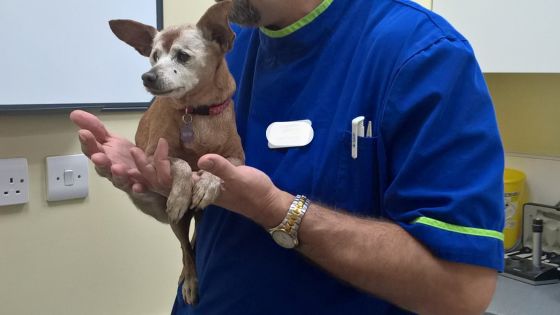Recognizing Signs of Illness in Senior Dogs
As our beloved canine companions age, they may start showing signs of illness that require our attention and care. Symptoms such as lethargy, loss of appetite, weight loss, increased drinking, peeing more and changes in behavior can indicate underlying health issues in senior dogs. It is crucial to be observant of these signs and seek veterinary advice promptly.
Seeking Professional Veterinary Care

When your senior dog is unwell, it is essential to consult a veterinarian for a proper diagnosis and treatment plan. Veterinarians are trained to assess the health of senior dogs and recommend appropriate medical interventions to improve their well-being. Regular check-ups and open communication with your vet are key in supporting your senior dog’s health.
You know your dog best and if you feel something is wrong, even if you can’t put your finger on what exactly it is, please see your vet and make sure he or she takes you seriously. Unfortunately, not all vets see value in senior dogs, and I know that from my own experience as well as the experience of many members of my FB group, Senior Dog Care Club.
If you vet dismisses your concerns, or gives you a diagnosis of “it’s old age” without even conducting one test, I recommend you run quickly and find yourself another vet. That attitude could put your senior dog’s life at risk.
Providing Comfort and Support

During times of illness, senior dogs need extra care and attention to help them feel comfortable and supported. Creating a cozy and quiet space for your furry friend, offering them nutritious meals, and administering medications as prescribed by the vet are ways to show your support during their recovery.
Understanding End-of-Life Care
As senior dogs age, it is important to consider end-of-life care options that prioritize their comfort and quality of life. Discussing these options with your vet and making informed decisions about pain management, hospice care, or euthanasia can help ensure a peaceful transition for your beloved senior dog.
I know this is a topic none of us want to talk about, but it’s important. I never talked about it or thought about it, and then I’m standing in the vet’s office with my first pet, a cat named Calypso and listening to the vet go through the horrible test results and how there’s nothing they can do.
The next thing I know I’m given a form to sign with the word euthanasia in huge letters across the top, and my vet asking what I want to do with her ashes. I knew I wanted them back (at least I knew that much!) so I was handed a catalogue of urns to choose from.
I know it sounds gruesome but my vet couldn’t have been nicer, it was just so overwhelming because I had no idea about any of this.
All I’m saying is, pretending these issues aren’t real can cause you to make decisions you regret later. Even thinking about it doesn’t guarantee that the answers will come quickly when faced with these situations, but it does mean we’ve taken the time to consider things calmly, not when panicked or under pressure.
Embracing the Journey Together

Supporting a senior dog through illness can be a challenging yet rewarding experience. By being attentive to their needs, seeking professional veterinary care, and providing comfort and support, you can make a positive impact on your furry friend’s quality of life during their golden years. Remember that your love and companionship are invaluable in helping your senior dog navigate through illness with grace and dignity.
If you’re looking for a community of senior dog parents, a place where you can find helpful tips, support and people who “get it” please join my FB group Senior Dog Care Club
I’ve been rescuing and caring for senior dogs since 2009. From vision and hearing loss to obesity, dementia, kidney disease, liver issues, cardiac problems, Cushing’s, mobility challenges and more, you could say I’ve dealt with and learned a lot! In addition to my hands on experience, I’ve taken many courses and earned several qualifications to keep learning how to help senior dogs and they include: Senior Dog Enrichment, Understanding Canine Anxiety (diploma), Care of the Senior Pet (certificate), Pet Bereavement Counsellor (diploma) and I’m a Certified Pet Loss Grief Support Coach.